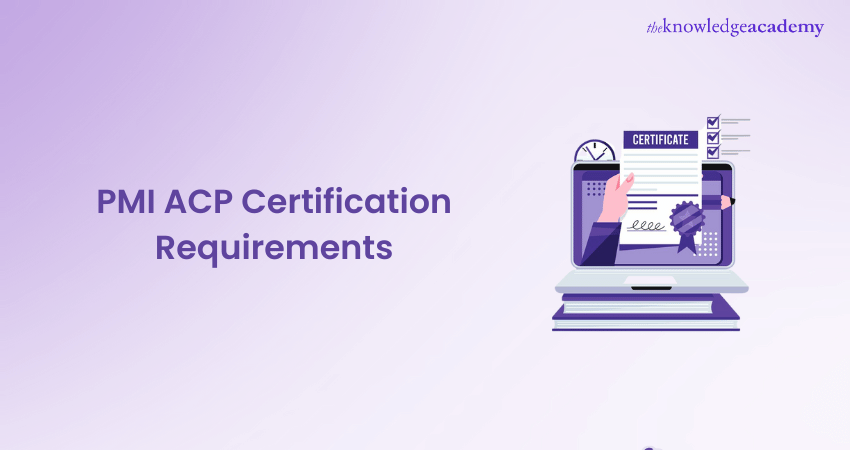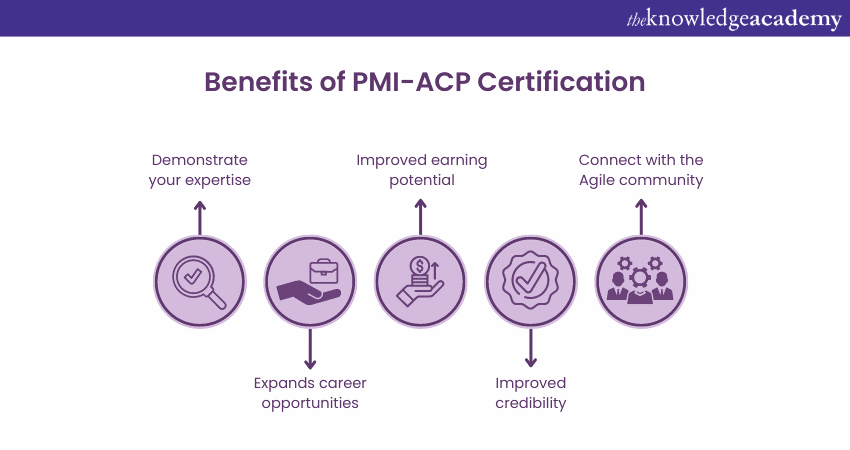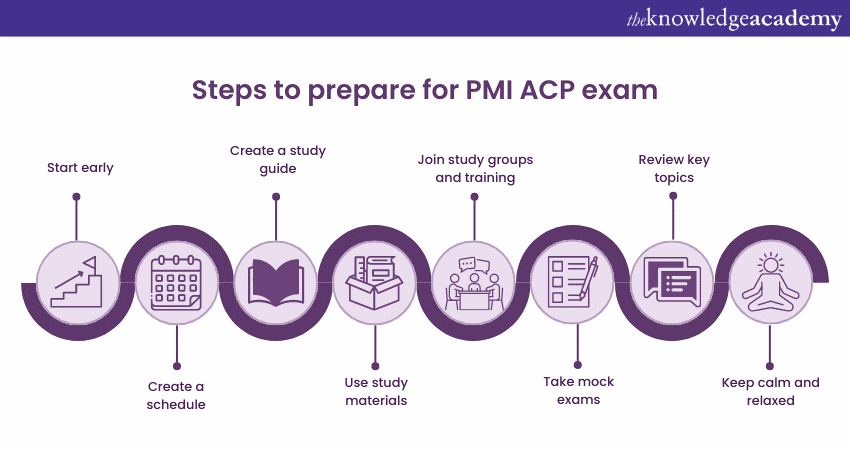We may not have the course you’re looking for. If you enquire or give us a call on 01344203999 and speak to our training experts, we may still be able to help with your training requirements.
We ensure quality, budget-alignment, and timely delivery by our expert instructors.

The PMI ACP Certification is one of the most renowned certifications in Project Management. Obtaining this certification can vastly improve your career prospects besides improving your earning potential. However, before applying, you need to know the PMI ACP Certification Requirements and whether you are eligible to apply.
Moreover, the PMI Salary Survey 12th edition states that, project professionals in the UK receive about 77,000 GBP. With all these, the future looks promising and highly rewarding for this Certification.
Thus, in this blog, we will talk about the PMI ACP Certification Requirements. You can also learn about how the Certification can help in your career advancement.
Table of Contents
1) What are the PMI ACP Certification Requirements?
2) How does getting a PMI-ACP Certification help?
3) What is the exam process?
4) How to prepare for the exam?
5) Conclusion
What are the PMI ACP Certification Requirements?
The eligibility criteria set by PMI are designed to check your educational qualification, experience in Project Management and training in Agile practices. Ensure that you should meet the eligibility criteria before participating in the PMI-ACP exam. These eligibility Requirements are explained below in detail:
Academic qualifications
When it comes to educational Requirements, there are no high expectations; however, PMI does set some minimum standards. Essentially, you should hold a Secondary Degree to qualify for the PMI-ACP exam. In addition, the PMI ACP Certification Requirements necessitate your institution’s name, graduation year, and major.
Experience
Although PMI didn't set any huge benchmarks for educational Requirements, it does set the bar relatively high regarding experience. However, the experience required here contains a mix of Agile Project Management experience and general Project Management experience. Let’s talk about them in detail:
a) General project experience: To satisfy this, you must hold at least 2000 hours of general project experience within the last five years. You should also be a part of non-overlapping project team(s) and summarised by the process group.
b) Agile project experience: Along with the general experience, Agile project experience also plays a crucial role. This necessitates you earning at least 1500 hours of Agile experience within the last three years.
Agile Training
Apart from the educational and experience Requirements, you should hold at least 21 contact hours of Agile Project Management Education. This training mostly provides knowledge on Agile Philosophy, Agile Methodologies, as well as Agile Principles and Practices.
When it comes to the education and experience requirement, there is no compromise, and you must fulfil it. However, completing the Project Management training before the exam date lets you submit your application. In this instance, satisfying the training requirement isn’t mandatory.
Accelerate your Agile Project Management expertise with our PMI-ACP® Certification Training and stay ahead in your career!
How does getting a PMI-ACP Certification help?
PMI-ACP was created to help Agile practitioners increase their knowledge of Agile frameworks. It helps in effective Project Management by improving your skills and knowledge of Agile methodologies and tools. Here are some of the other ways it can help you:

a) Demonstrate your expertise: This qualification helps proves that the holder is proficient in Agile frameworks like Lean, Kanban, Scrum, XP, and others. It also proves that the person is well-qualified to oversee Agile projects and can add more value to the company.
b) Expands career opportunities: Many businesses use Agile to improve their approach to Project Management, so there is a huge demand for relevant professionals. Having certain certifications can help you stand out and increase your career opportunities.
c) Improved earning potential: Project Management professionals with certifications like PMI-ACP generally make more money than those without any certifications. This clearly shows the importance of PMI-ACP Salary, as the PMI Salary Survey shows that people with the PMI-ACP certification make more money than those who don't have it. This further proves the importance businesses place on Agile frameworks and methodologies.
d) Improved credibility: The PMI-ACP certification holds a high value and has a special place among many Project Management professionals and experts. Collaboratively, you can share insights and help each other keep up with the recent advancements in the Agile community.
e) Connect with the Agile community: Obtaining this certification provides access to the exclusive Agile community. It also helps get in touch with like-minded Agile practitioners and experts. They can share insights and best practices and help each other keep up with the recent advancements in the Agile community.
What is the exam process?
The PMI ACP Exam Questions are designed to determine and validate a person's knowledge of Agile methodologies. Although it is not an easy exam, the right preparation can help you pass it and obtain your certification.
Exam cost
Before applying for the exam, you should know the cost and plan your decisions accordingly. If you are a member of PMI, the exam cost is 348 GBP; if you are not, the price is 396 GBP.
How to apply?
If you think you are eligible to write this exam, you can go to PMI's official website and apply there. Before applying for the PMI-ACP exam, you must register and create a new account. Once you created a new account and logged in, you can apply for the exam there.
Exam questions
The exam consists of 120 multiple-choice questions; about 20 questions are considered pretest questions and do not affect the score in any way. The exam is computer-based in most cases, but paper-based testing is also available in some cases.
The total duration of the exam is three hours. Regarding the questions, 50 per cent of them are based on Agile tools and methods. The remaining 50 per cent focuses on Agile Tools and knowledge. Given below is a list of topics covered in Project Risk Management Course and techniques:
a) Planning
b) Agile estimation
c) Monitoring and adapting
d) Design and analysis using Agile
e) Communications
f) Product Quality
g) Risk management
h) Value stream analysis
The remaining 50 percent of the questions are based on experience and skills, and here is the list of the topics covered:
a) Agile Frameworks and terminologies
b) Building teams
c) Values and Techniques of Agile Manifesto
d) Mentoring teams
e) Communication and feedback
f) Prioritisation and problem-solving
g) Agile tools and techniques
How to prepare for the exam?
Many people work hard and study well for the exam but often fail to transition that effort into actual results. This can be the result of a lack of preparation. Hence, we have discussed below the step-by-step instructions to prepare for the exam:

Step 1:
Prepare early: The primary aspect of preparing for the exam is time management. Many people who do well on these exams are masters of time management. So, start your preparation early to manage your time efficiently.
Step 2:
Create a schedule: The next important thing to do is create a study plan and preparation plan. Creating schedules can be complicated; sometimes, you may need to go back and make changes. So, ensure the schedule is flexible and has enough room to adopt any changes.
Step 3:
Prepare a Study guide: Prepare a PMI-ACP Study Guide, note essential topics, and mark a date on your schedule for studying each topic. Study the critical topics and review them frequently to remember key concepts. Although this step is often overlooked by many, it has the potential to skew the results in your favour.
Step 4:
Use study materials: Use materials like the Project Management Body of Knowledge (PMBOK) guide to sharpen your knowledge. Try to get your hands on official resources as they provide. Once you are done with that, you can move on to free resources.
Step 5:
Join study groups and training: You can join online study groups and forums if you don't like to prepare alone and need help. It can highly benefit you by providing with useful insights and feedback from many people. Joining a training can also help you prepare for the exam in the best way. Besides, it is also an essential part of the PMI ACP Eligibility requirement.
Step 6:
Take mock exams: These exams help you understand how the exam works. It further determines the subjects you are lacking in so you can improve. Overall, it can optimise your time by giving an idea of the amount of time a question requires.
Step 7:
Review key topics: This step is very crucial during the final stages of the preparation. Reviewing important topics and previous set of questions can be very beneficial and helps you understand the exam structure.
Step 8:
Keep calm and relaxed: Some people prepare well for the exam but often fail to get the result that they hoped for. This is mainly due to the stress associated with exams, and some people are often overwhelmed by exam-related stress. Keeping a cool head can help them prevail on the exam. So, keep your nerves calm by preparing yourself mentally and physically.
Overall, to perform well in the exam, you need to prepare well for the exam. Mock exams can help you prepare mentally as they simulate an exam-like environment. With consistent practice, you will get used to the exam environment and overcome any exam-related stress. Keeping yourself hydrated and taking deep breaths can help you stay relaxed physically.
Approval and eligibility period
Once you submit your application, PMI will review and respond within 24 hours. After approval, you may receive an invitation to make the payment and schedule your exam date. Successfully Passing the PMI ACP Exam is crucial, and you have up to one year to take it. Additionally, within this period, you are allowed to retake the exam up to three times if needed.
Master Project Management with our PMP certification training and take your career to new heights with the PMP® Certification Training Course.
Conclusion
We hope this blog thoroughly familiarises you with the PMI ACP Certification Requirements and the exam process. Obtaining this certification has a lot of PMI-ACP Benefits like improved career opportunities, improved pay and benefits, etc. This certification helps improve your credibility and connect with the Agile community.
Supercharge your Project Management skills with our PMP® Training and unlock new career opportunities!
Frequently Asked Questions
Are there any prerequisites for maintaining PMI-ACP certification?

The PMI-ACP Certification remains valid for three years. To keep your certification during that period, the organisation needs you to fulfil Continuous Certification Requirements (CCR). Those Requirements include obtaining 30 Professional Development Units (PDUs).
Will PMI-ACP certification improve our company's project delivery efficiency and effectiveness?

Yes, certified PMI-ACP professionals bring expertise by contributing to more efficient, agile, and successful project deliveries. This expertise, in turn, can lead to better organisational outcomes. From increased customer satisfaction and overall business growth, they can serve each purpose.
What are the other resources and offers provided by The Knowledge Academy?

The Knowledge Academy takes global learning to new heights, offering over 3,000 online courses across 490+ locations in 190+ countries. This expansive reach ensures accessibility and convenience for learners worldwide.
Alongside our diverse Online Course Catalogue, encompassing 19 major categories, we go the extra mile by providing a plethora of free educational Online Resources like News updates, Blogs, videos, webinars, and interview questions. Tailoring learning experiences further, professionals can maximise value with customisable Course Bundles of TKA.
What is the Knowledge Pass, and how does it work?

The Knowledge Academy’s Knowledge Pass, a prepaid voucher, adds another layer of flexibility, allowing course bookings over a 12-month period. Join us on a journey where education knows no bounds.
What are related courses and blogs provided by The Knowledge Academy?

The Knowledge Academy offers various PMP Training, including the PMP Certification Training, CAPM Certification Training, and PMI-ACP Certification Training. These courses cater to different skill levels, providing comprehensive insights into the Project Scheduling Best Practices.
Our Project Management Blogs cover a range of topics related to PMI-ACP, offering valuable resources, best practices, and industry insights. Whether you are a beginner or looking to advance your Project Management skills, The Knowledge Academy's diverse courses and informative blogs have got you covered.
Upcoming Project Management Resources Batches & Dates
Date
 PMP® Certification Training Course
PMP® Certification Training Course
Sat 19th Apr 2025, Sun 20th Apr 2025
Tue 22nd Apr 2025
Mon 28th Apr 2025
Sat 3rd May 2025, Sun 4th May 2025
Tue 6th May 2025
Mon 12th May 2025
Sat 17th May 2025, Sun 18th May 2025
Mon 19th May 2025
Tue 27th May 2025
Mon 2nd Jun 2025
Sat 7th Jun 2025, Sun 8th Jun 2025
Mon 9th Jun 2025
Mon 16th Jun 2025
Sat 21st Jun 2025, Sun 22nd Jun 2025
Mon 23rd Jun 2025
Mon 30th Jun 2025
Sat 5th Jul 2025, Sun 6th Jul 2025
Mon 7th Jul 2025
Mon 14th Jul 2025
Sat 19th Jul 2025, Sun 20th Jul 2025
Mon 21st Jul 2025
Mon 28th Jul 2025
Sat 2nd Aug 2025, Sun 3rd Aug 2025
Mon 4th Aug 2025
Mon 11th Aug 2025
Sat 16th Aug 2025, Sun 17th Aug 2025
Mon 18th Aug 2025
Tue 26th Aug 2025
Mon 1st Sep 2025
Sat 6th Sep 2025, Sun 7th Sep 2025
Mon 8th Sep 2025
Mon 15th Sep 2025
Sat 20th Sep 2025, Sun 21st Sep 2025
Mon 22nd Sep 2025
Mon 29th Sep 2025
Sat 4th Oct 2025, Sun 5th Oct 2025
Mon 6th Oct 2025
Mon 13th Oct 2025
Sat 18th Oct 2025, Sun 19th Oct 2025
Mon 20th Oct 2025
Mon 27th Oct 2025
Mon 3rd Nov 2025
Sat 8th Nov 2025, Sun 9th Nov 2025
Mon 10th Nov 2025
Mon 17th Nov 2025
Sat 22nd Nov 2025, Sun 23rd Nov 2025
Mon 24th Nov 2025
Mon 1st Dec 2025
Sat 6th Dec 2025, Sun 7th Dec 2025
Mon 8th Dec 2025
Mon 15th Dec 2025
Sat 20th Dec 2025, Sun 21st Dec 2025






 Top Rated Course
Top Rated Course



 If you wish to make any changes to your course, please
If you wish to make any changes to your course, please


